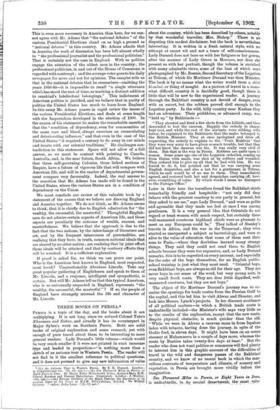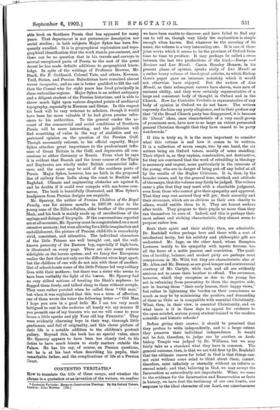THREE BOOKS ON PERSIA.*
PERSIA. is a topic of the day, and the books about it are multiplying. It is not long since we noticed Colonel Yate's Khurasan and Sietan, and already it has its counterpart in Major Sykes's work on Southern Persia. Both are solid books of original exploration and some research, yet with enough of pure travel about them to be interesting to mere general readers. Lady Durand's little volume—which would be very much smaller if it were not printed in such immense type and leaded in proportion—" is nothing more than a sketch of an autumn tour in Western Persia. The reader will not find in it the smallest reference to political questions, and it does not pretend to give any new information of value • (1.) An Autumn Tour in Western Persia. By E. B. Durand. London : A. Constable and Co. C7s. 6d. net.]—(2.) Ten Thousand Miles in Persia, or Irtht Years in Iran. By Major Percy Molesworth Sykes, Queen's Bays, H.M. Consul, Eernian and Persian Baluchistan. Illustrated. London : J. Murray. !taw. net.1—(3.) Persian Children of• the Royal .Faeoily.: the Narrative of an x.nglialt Tutor at the Court of S.I.H. Zillu's•Sulten. O.C,S.Z 1Fli• Sparroy. T ondon 1 John Lane. • [12s. 6d. n k f - . -
about the countay, which has been described by others, notably by that wonderful traveller, Mrs. Bishop." There is no disputing this modest disclaimer, but the book is nevertheless interesting. It is written in a fresh natural style, with no attempt at smart wit and not a trace of self-consciousness. Lady Durand does not bore us with her fatigues or her gowns,
after the manner of Lady Grove in Morocco, nor does she present us with her portrait, though the volume is enriched with many admirable views, some of the best of which were photographed by Mr. Rennie, Second Secretary of the Legation at Tehran, of which Sir Mortimer Durand was then Minister.
The book is by no means what the writer would term a chizi bi-nuini, or thing of nought. As a picture of travel in a some- what difficult country lit is decidedly good, though there is little that will be new to the experienced reader. A journey through the Bakhtiari country is not devoid of danger, even with an escort, but the robbers proved civil. enough to the
Legation party. In the wild, hilly country near rashan they had an adventure. Their pishkho,na, or advanced camp, was "held up" by Bakhtiaris :— " They shouted and fired a few shots from the hillside, and then descended to loot the caravan. Happily the orderly in charge kept cool, and while the rest of the servants were sobbing with terror, he explained to the Bakhtiaris that the mules belonged to the British Minister. They at once apologised and drew off, requesting the orderly to explain to the Vests Mukht&r' that they were very sorry to have given so much trouble, but that they did not know the caravan was his. It was really very civil of them. But that is the way in Persia. Robbers are quite open to reason. Some years ago one of the Legation orderlies, coming up from Shiraz with mails, was shot at by robbers and wounded. They ordered him to give up all that he had with him. He was forced to do it, but pointed out that he was carrying some English despatches, and also a hat for a gentleman in Tehran, which he said would be of no use to them. They immediately agreed, and restored both hat and despatches, carrying off, how- ever, everything of value. By which words I mean no disrespect to the Foreign Office."
Later in their tour the travellers found the Bakhtiari chiefs remarkably friendly and hospitable : " not only did they behave with the greatest courtesy to our party in general, but
they asked to see me," says Lady Durand, "and were so polite and agreeable that they made me feel at once I was among gentlemen. It is a very general idea that Orientals do not regard or treat women with much respect, but certainly these well-mannered courteous highland chiefs were as pleasant to meet as any European could be." They talked of Stanley's travels in Africa, and the war in the Transvaal ; they even started so unexpected a subject as bacteriology, and were so alive to the value of education that some of them sent their sons to Paris,—where they doubtless learned many strange things. They said they could not send them to English schools because they were too expensive, and, as Lady Durand remarks, this is to be regretted on every account, and especially for the sake of the boys themselves, for an English public- school training is just what they most need. " Oriental boys, even Bakhtiari boys, are always so old for their age. They are never boys in our sense of the word, but very young men, in very small frock coats. They are dear little dignified, well- mannered creatures, but they are not boys."
The object of Sir Mortimer Durand's journey was to ex- amine the openings for trade routes from the Persian Gulf to the capital, and this led him to visit Ahwaz and Shustar, and look into Messrs. Lynch's projects. In her discreet avoidance of all political matters—in which a British trade route is undoubtedly included—the Minister's wife says very little as to the results of the exploration, except that the new route, despite physical obstacles, is much quicker than the old. " While we were in Ahwaz a caravan came in from Ispahan laden with tobacco, having done the journey, in spite of the Goar ford, in eleven days. It might have been on an ocean steamer at Muhammera in a couple of days more, whereas the route by Bushire takes twenty-five days at least." But the reader who does not want politics or commerce will find plenty to interest him in this graphic account of the difficulties of
travel in the wild and dangerous passes of the Bakhtiari country, and we know of no recent book in which the mar- vellous contrasts of temperature and climate, of scenery and vegetation, in Persia are brought more vividly before the
imagination.
Ten Thousand Miles in, Persia, or Eight Years in Iran, is undoubtedly. in its special department; the most • valn-
able book on Southern Persia that has appeared for many years. That department is not picturesque description nor social studies ; in both subjects Major Sykes has been fre- quently excelled. It is in geographical exploration and topo- graphical identification that the work stands pre-eminent, and there can be no question that in his travels and surveys in several unexplored parts of Persia to the east of the great desert he has made definite additions to geographical know- ledge. In spite of the writings of Professor Browne, Mr.
Stack, Sir F. Goldsmid, Colonel Yate, and others, Kerman, Yea Sistan, and Persian Baluchistan have remained almost
fer-ras incognitae, and no one is better qualified to lift the veil than the Consul who for eight years has lived principally in these unfamiliar regions. Major Sykes is an ardent antiquary and a diligent student of the Persian historians, and is able to throw much light upon various disputed points of mediaeval topography, especially in Kerman and Sistan. In this respect his book will be very welcome to scholars, though it would have been far more valuable if he had given precise refer- ences to his authorities. To the general reader the ac- count of the commercial and social conditions of Southern Persia will be more interesting, and the politician will find something of value in the way of statistics and ex- perienced opinion on the question of the Persian Gulf. Though necessarily reticent, in his official capacity, Major Sykes attaches great importance to the predominant influ- ence of Great Britain in the Gulf, and deprecates all con- cessions to either Germany or Russia. From what he says it is evident that Basrah and the lower course of the Tigris and Euphrates are wholly under British commercial influ- ence, and the same may be said of the southern ports of Persia. Major Sykes, however, has no faith in the proposed line of railway from India along the coast to Bushire and Baghdad. Climate and engineering obstacles are against it, and he doubts if it could ever compete with sea-borne com- merce. The book is beautifully illustrated, and Miss Sykes's headpieces from Persian designs are exquisite.
Mr. Sparroy, the author of Persian Children of the Royal Family, was for sixteen months in 1897-98 tutor to the young sons of the Zillu-s-Sultan, elder brother of the present Shah, and his book is mainly made up of recollections of the sayings and doings of his pupils. If the conversations reported are at all accurate, Mr. Sparroy must be congratulated on a most retentive memory; but even allowing fora little imagination and embellishment, the picture of Persian child-life is remarkably vivid, consistent, and attractive. The individual characters of the little Princes are well brought out, and the well- known precocity of the Eastern boy, especially if high-born, is illustrated on every page. There are also many curious sidelights on the harem system, and we fancy few Europeans realise the fact that not only are the different wives kept apart, but the children of one wife do not mix with those of another. Out of school-hours some of the little Princes led very solitary lives with their mothers ; but there was a sister who seems to have been veritably the light of the harem. Mr. Sparroy had no very stilted notions of treating the Shah's nephews : he flogged them freely, and talked slang to them without scruple. They were rather puzzled when he called them " Old man," but when it was explained that this was a term of affection, one of them wrote the tutor the following letter :—" Old Man I hope you arre in a good hellz Me I am too very much fattigued to rest in the andarun all lonely wiz my muzzer If you permitt one of my buzzers wiz me we will come to your house a little speeke and ply Your old boy FEBIDIIN." Tbey were evidently charming boys in their way, thorough little gentlemen, and full of originality, and this clever picture of their life is a notable addition to the children's portrait gallery. Beyond this, the book has no special value, since Mr. Sparroy appears to have been too closely tied to his duties to have much leisure to study matters outside the Palace. He has his say, of course, on Persian questions, but be is at his best when describing his pupils, their remarkable father, and the complications of life at a Persian Court.







































 Previous page
Previous page